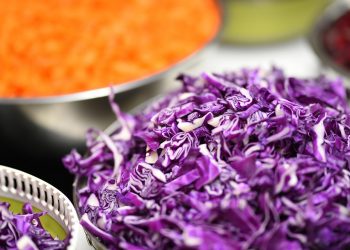Contents
Five Ways Miso Soup Boosts Your Gut Health
Midday, you find yourself with a slight slump—a familiar feeling that nudges you to reach for something comforting. Maybe a warm bowl of miso soup sounds good right about now? This traditional Japanese dish does more than just warm you up; it offers an array of benefits, particularly for your gut health. Here, we’ll explore five ways miso soup can help optimize your digestion, grounded in science and culinary tradition.
1. Probiotics: The Friendly Bacteria
The star ingredient of miso soup is, of course, miso paste. This fermented soybean product is a powerhouse of probiotics, the beneficial bacteria crucial for gut health. Probiotics are known for improving digestion, enhancing the absorption of nutrients, and maintaining the balance of gut flora.
A study published in the Journal of Functional Foods found that fermented foods, including miso, can significantly increase the diversity of gut microbiota, which is important for a robust digestive system (Marco et al., 2021). The more diverse your gut bacteria, the better your body can break down food and combat harmful pathogens.
However, it’s essential to note that not all miso is created equal. Some miso pastes are pasteurized, which may kill off the beneficial bacteria. Opt for unpasteurized varieties to reap the full benefits.
2. Rich in Nutrients
Miso soup isn’t just beneficial for your gut; it’s also loaded with nutrients. A traditional serving typically includes miso paste, water, and dashi (a broth made from kelp and fish). You might also add tofu, seaweed, or green onions, making it a nutritional gem.
Miso is a good source of vitamins and minerals such as vitamin K, manganese, copper, and zinc. These nutrients contribute to various bodily functions, including digestion and immune support. A study by the American Journal of Clinical Nutrition highlights how essential micronutrients can aid in maintaining healthy gut function (Chaparro et al., 2020).
Yet, moderation is key. Miso is relatively high in sodium, so those monitoring their salt intake should pay attention to the amount used in their soup.
3. Enhances Digestion Through Enzymes
Digestive enzymes play a crucial role in breaking down the food you eat, allowing your body to absorb nutrients effectively. Miso soup is not only rich in probiotics, but it also contains natural enzymes that facilitate digestion.
The fermentation process involved in making miso activates these enzymes, which can help digest proteins and carbohydrates, potentially easing symptoms of food intolerance and improving overall digestion. According to research found in the Journal of Agricultural and Food Chemistry, the enzymes present in fermented foods like miso can enhance nutrient absorption, making them easier for your body to utilize (Fujimoto et al., 2022).
While enzymes can support digestion, those with specific gastrointestinal conditions, such as pancreatitis, should consult a healthcare provider before making fermented foods a staple of their diet.
4. Anti-inflammatory Properties
Chronic inflammation in the gut can lead to a variety of digestive issues, including irritable bowel syndrome (IBS) and inflammatory bowel disease (IBD). Miso soup has been shown to possess anti-inflammatory properties, making it a wise choice for promoting gut health.
Research has indicated that fermented soy products, including miso, can help reduce markers of inflammation in the body. A study highlighted in the Nutrition Journal found that probiotic-rich foods like miso may reduce the inflammatory response in human subjects (McCarthy et al., 2017).
Still, it’s worth mentioning that while miso soup can be part of an anti-inflammatory diet, it should not replace medical treatments for serious conditions. Always consult a healthcare professional for personalized advice.
5. Supports a Balanced Diet
Incorporating miso soup into your meals not only benefits your digestive health but can also guide you toward a more balanced diet. It encourages the consumption of fresh vegetables, tofu, and quality proteins, promoting a nutrient-rich meal.
The dietary habits rooted in Japanese cuisine, which features miso soup, often encourage smaller portions and mindful eating. This approach can aid in appetite regulation, which is essential for maintaining a healthy weight and promoting digestion.
According to a study in the British Journal of Nutrition, adopting aspects of the traditional Japanese diet, which includes fermented foods, has been associated with lower risks of obesity and metabolic syndrome (Kearns et al., 2020).
Adopting healthy eating habits alongside enjoying miso soup means focusing on a variety of foods rather than relying on any single item for health benefits.
FAQs
1. Can everyone eat miso soup?
Generally, yes, but if you’re sensitive to soy or have high sodium dietary restrictions, be cautious. Consult a healthcare professional if you have allergies or specific health concerns.
2. How often should I consume miso soup for gut health benefits?
Moderation is key. Including miso soup a few times a week as part of a balanced diet can contribute to gut health, but it’s best not to rely solely on it.
3. Are there other ways to enjoy miso besides soup?
Absolutely! Miso can be used in dressings, marinades, and even as a flavoring for roasted vegetables. Get creative while maintaining the health benefits!
4. Is miso soup safe for pregnant women?
Miso is generally safe during pregnancy, but it’s advisable to consult with a healthcare provider regarding dietary restrictions and to be mindful of sodium intake.
Conclusion
Miso soup is not just a comforting dish; it’s a small yet mighty ally for your gut health. With its range of probiotics, rich nutrient profile, digestive enzymes, anti-inflammatory properties, and role in promoting balanced eating habits, it’s a simple addition that can yield significant benefits. As you savor each warm, savory spoonful, remember—what you nourish your body with can lead to profound effects on your overall well-being.
If you’re new to miso soup, consider starting with a basic recipe and gradually adding your favorite ingredients. With each bowl, you’re not just enjoying a meal; you’re also investing in your health.
References
- Marco, M. L., et al. (2021). Fermented foods and their impact on gut microbiota: A review of clinical trials. Journal of Functional Foods.
- Chaparro, C. J., et al. (2020). Nutritional management of the gut: The role of micronutrients. American Journal of Clinical Nutrition.
- Fujimoto, Y., et al. (2022). Enzymatic improvement of nutrient absorption in fermented foods. Journal of Agricultural and Food Chemistry.
- McCarthy, H. D., et al. (2017). Probiotic effects and inflammation: A systematic review of human studies. Nutrition Journal.
- Kearns, C., et al. (2020). The Japanese diet: Its influence on the status of obesity and metabolic syndrome. British Journal of Nutrition.
Get Your FREE Natural Health Guide!
Subscribe now and receive our exclusive ebook packed with natural health tips, practical wellness advice, and easy lifestyle changes — delivered straight to your inbox.














